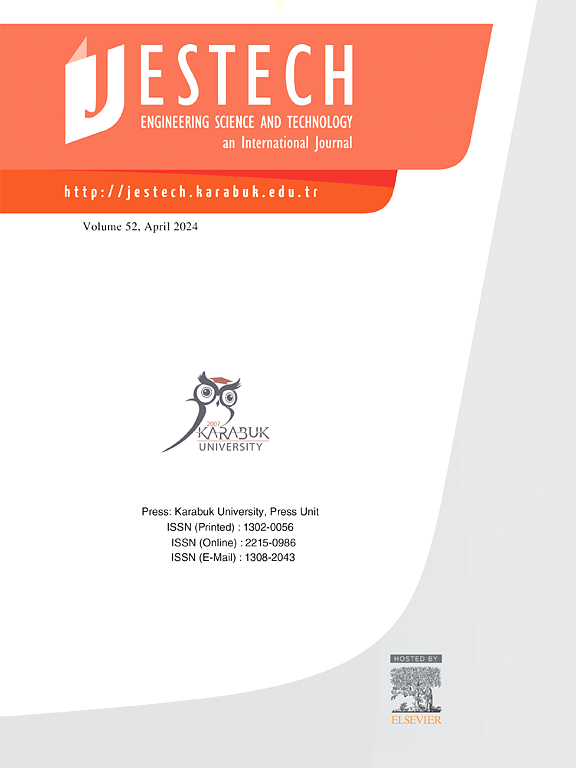Fuzzy logic-based simulation of a weighted integrated GNSS receiver for mitigating blocking interference effects
IF 5.4
2区 工程技术
Q1 ENGINEERING, MULTIDISCIPLINARY
Engineering Science and Technology-An International Journal-Jestech
Pub Date : 2025-08-18
DOI:10.1016/j.jestch.2025.102171
引用次数: 0
Abstract
The aim of this paper is to enhance the accuracy and speed of receivers in integrated Global Navigation Satellite System (GNSS) systems, ensuring the ability to maintain precise and high-quality positioning even in blocking conditions. To this end, a novel approach is proposed to improve the performance of receivers in integrated GNSS systems, which includes two-stage acquisition, fuzzy logic, and a weighting mechanism based on the Weighted Least Squares (WLS) algorithm. In this method, a two-stage acquisition process is initially employed to achieve rapid and accurate acquisition. Then, the number of visible satellites, the Carrier-to-Noise Ratio (CNR) extracted during the tracking phase, and the Dilution of Precision (DOP) are used as inputs to the fuzzy logic membership function. Through fuzzy rules, the WLS weighting coefficients are optimally determined. Experimental results indicate that the WLS method with fuzzy logic coefficients significantly enhances system performance. Specifically, an average improvement of 36.50% in Root Mean Square (RMS) error and a 31.10% reduction in Geometric Dilution of Precision (GDOP) have been observed compared to the Least Squares (LS) method.
基于模糊逻辑的加权集成GNSS接收机抑制阻塞干扰的仿真
本文的目的是提高全球导航卫星系统(GNSS)系统中接收机的精度和速度,确保即使在阻塞条件下也能保持精确和高质量的定位。为此,提出了一种新的方法来提高集成GNSS系统中接收机的性能,该方法包括两阶段采集、模糊逻辑和基于加权最小二乘(WLS)算法的加权机制。在该方法中,最初采用两阶段采集过程,以实现快速准确的采集。然后,将可见卫星数、跟踪阶段提取的载波噪声比(CNR)和精度稀释(DOP)作为模糊逻辑隶属度函数的输入。通过模糊规则优化确定WLS的权重系数。实验结果表明,采用模糊逻辑系数的WLS方法可以显著提高系统性能。具体而言,与最小二乘(LS)方法相比,该方法的均方根误差(RMS)平均提高36.50%,几何精度稀释(GDOP)平均降低31.10%。
本文章由计算机程序翻译,如有差异,请以英文原文为准。
求助全文
约1分钟内获得全文
求助全文
来源期刊

Engineering Science and Technology-An International Journal-Jestech
Materials Science-Electronic, Optical and Magnetic Materials
CiteScore
11.20
自引率
3.50%
发文量
153
审稿时长
22 days
期刊介绍:
Engineering Science and Technology, an International Journal (JESTECH) (formerly Technology), a peer-reviewed quarterly engineering journal, publishes both theoretical and experimental high quality papers of permanent interest, not previously published in journals, in the field of engineering and applied science which aims to promote the theory and practice of technology and engineering. In addition to peer-reviewed original research papers, the Editorial Board welcomes original research reports, state-of-the-art reviews and communications in the broadly defined field of engineering science and technology.
The scope of JESTECH includes a wide spectrum of subjects including:
-Electrical/Electronics and Computer Engineering (Biomedical Engineering and Instrumentation; Coding, Cryptography, and Information Protection; Communications, Networks, Mobile Computing and Distributed Systems; Compilers and Operating Systems; Computer Architecture, Parallel Processing, and Dependability; Computer Vision and Robotics; Control Theory; Electromagnetic Waves, Microwave Techniques and Antennas; Embedded Systems; Integrated Circuits, VLSI Design, Testing, and CAD; Microelectromechanical Systems; Microelectronics, and Electronic Devices and Circuits; Power, Energy and Energy Conversion Systems; Signal, Image, and Speech Processing)
-Mechanical and Civil Engineering (Automotive Technologies; Biomechanics; Construction Materials; Design and Manufacturing; Dynamics and Control; Energy Generation, Utilization, Conversion, and Storage; Fluid Mechanics and Hydraulics; Heat and Mass Transfer; Micro-Nano Sciences; Renewable and Sustainable Energy Technologies; Robotics and Mechatronics; Solid Mechanics and Structure; Thermal Sciences)
-Metallurgical and Materials Engineering (Advanced Materials Science; Biomaterials; Ceramic and Inorgnanic Materials; Electronic-Magnetic Materials; Energy and Environment; Materials Characterizastion; Metallurgy; Polymers and Nanocomposites)
 求助内容:
求助内容: 应助结果提醒方式:
应助结果提醒方式:


